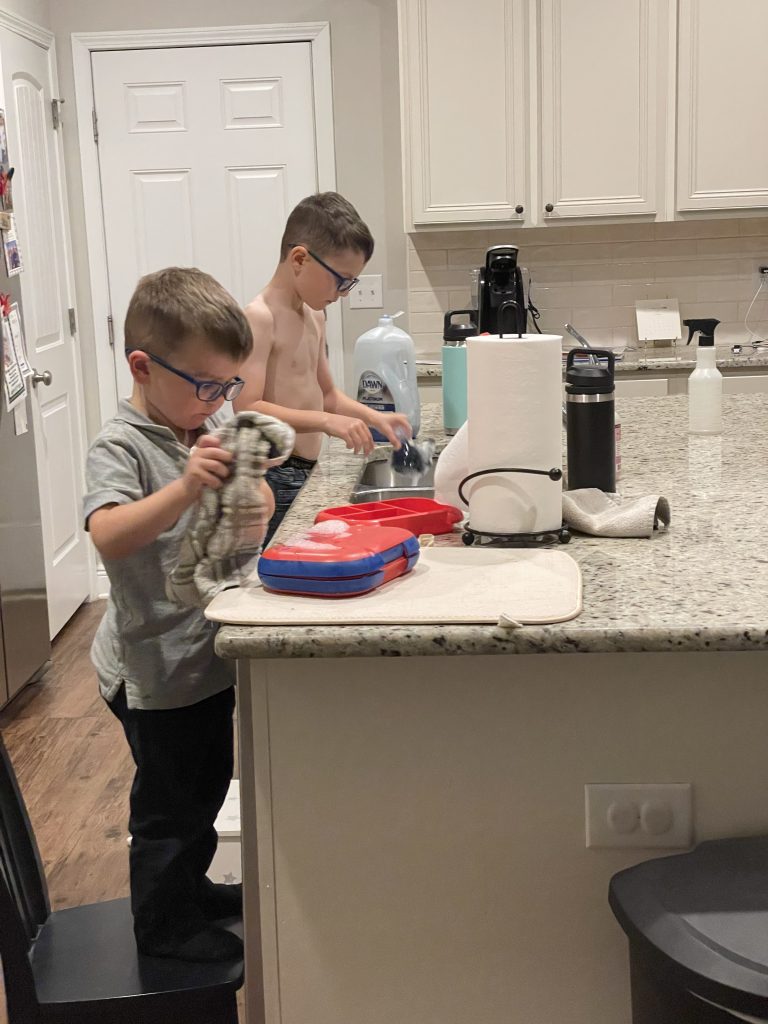As a mom of two young boys under the age of six and a middle school teacher, I have needed to use effective communication with my children and students. Recently, I witnessed positive behavior changes related to how I specifically spoke to them about their actions. It was eye-opening, but honestly, one of the simplest concepts: praise.
We all know encouraging words, nice sentiments, and smiles can be motivators for children, but using specific praising can make all the difference.
Witnessing the Power of Praise
After dinner one night recently, I was cleaning the kitchen and noticed my boys were very interested in helping, so I gave them specific jobs to feel included. Afterward, we talked all about it.
“How fun was it to do chores together as a team?!”
“I LOVED the way you worked with your brother to wash and dry.”
“You really showed your brother the right way to use a scrub brush.”
“This was the most fun I have had cleaning the kitchen!”
“I have never seen the dishes so clean. What a big help you are!”
These seem so simple to say or mention, but the behavior response was shocking.
The boys did it again the next day and the next! (unprompted, I promise!) They could NOT wait to be a part of the cleaning team again.

The encouragement was specific and made them feel like they had a very important job.
I had a similar experience with my middle school students, after taking a difficult test they had the option to retake it to achieve their highest grade. I noticed three students stand out. These three students got a 90% the first time and kept working on getting a 100. The students could stop after they achieved a 90, but they decided to do the work. I could not have been more proud of them.
That day, I emailed their parents to tell them how proud they should be of their child, and I talked to my classes the next day about it. I gushed over these students to not only praise them but to encourage the others. I needed to show them the power of their potential.
“This is where our character is defined- when people are not watching. The drive you exhibited to achieve more was inspiring.”
For the next test, I had over 50 students reach for the higher A. I gave out treats, called out their names in front of the class, and made sure they knew I saw their hard work.
Wise words from an experienced teacher:
My mother, a kindergarten teacher for 30 years, shares some of her wisdom:
“I have always been a true believer in positive praise versus negative correction. Redirection and discipline certainly have their place; we are all human beings and have our limits with young children’s behavior! There is research that has said it takes a LARGE number of positive affirmations to “undo” a negative “correction”.
Being a kindergarten/early childhood teacher for 30 years, I have learned a lot about young children. They do respond to and love positive adult praise. To make it even better, specific praise can be even more powerful and enhance their growth. For example, telling a child they have done a “good job” sends a nice message. However, when your words are more targeted, such as, “Cohen, when you cleaned and straightened your bookcase just now, it was so helpful! Now we can easily find our storybooks tonight when it’s bedtime!” For a week straight, Cohen was in his room fixing his books just from that one comment!
I use this same tactic in the classroom when I praise my super writers. I say, “I am so proud of Brooklynn’s writing! She added details such as a sun, grass, and flowers to her drawing. She tapped out the sounds in the words and labeled her pictures. Way to go, Brooklynn!” This kind of praise definitely goes so far for teachers and lets children know exactly what they need to do to be successful.”
As moms, we are all teachers. Our roles are to motivate and inspire.
Try these phrases:
“I love the way you…”
“I am so proud of you because…”
“When you did ______, it was so helpful.”
“I saw you do your best at _____.”














